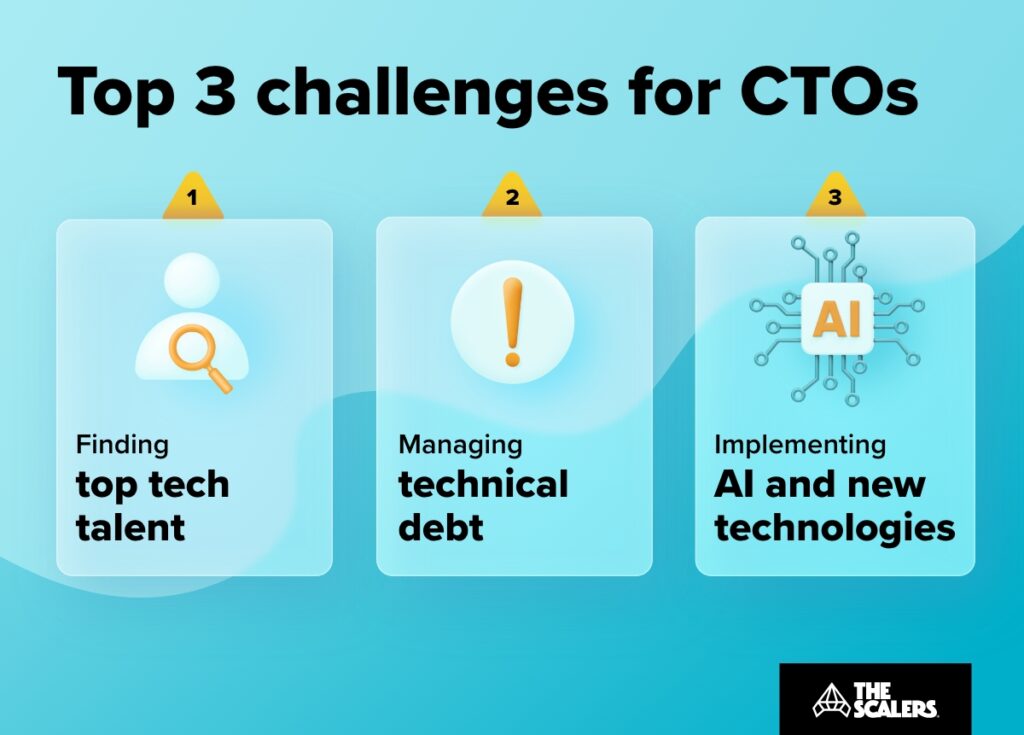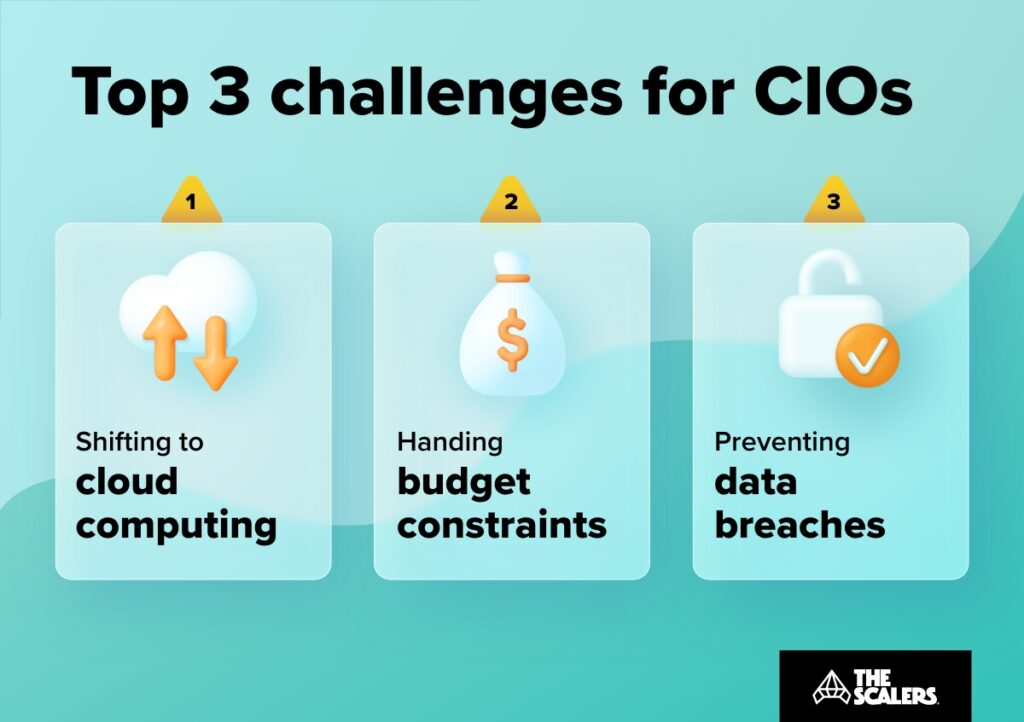As a CTO or CIO, you make critical business decisions daily.
Among other tasks, you oversee technology policies, own the development and delivery process, and align IT infrastructure with strategic goals. Depending on your organisation’s structure, you may also be responsible for building dedicated development teams.
Such duties present obstacles that compromise your success as a tech leader.
In this article, we analyse the top three challenges for CTOs and CIOs today (and in the near future) so you can prepare an action plan and effectively tackle them.
To configure the list, we’ve considered our 10+ years of experience building 80+ tech teams for companies worldwide and our conversations with top-level executives.
Let’s get started!
Challenges for CTOs
Every day, CTOs face a host of challenges that shape the trajectory of their organisation as they develop and implement technological strategies. These are the top three CTO challenges today.

Finding top tech talent
CTOs, CIOs and VPs of Engineering aren’t the same. These are three different tech and business leaders with their own set of responsibilities.
When it comes to looking for world-class talent, CTOs are usually the ones searching for the best candidates to join their companies’ engineering teams.
However, with the Western tech talent shortage affecting every industry, assembling an A-team is more challenging than ever. CTOs in the US, Europe, and Australia struggle to find software engineers, programmers and other tech professionals with niche skills in their local or neighbouring regions.
The solution? Business practices like outsourcing and offshoring — especially its modern approach known as offshoring 2.0 — are seen as excellent options for searching, hiring, and onboarding elite talent in tech hubs such as Bangalore, India.

Discover how to scale development teams in 2023 and beyond
DOWNLOAD EBOOKManaging technical debt
Tackling technical debt is a nightmare for leaders. Indeed, 35% of CTOs name it as their biggest challenge in the past two years.
Tech debt can cause problems like system crashes and downtime, making it harder for CTOs and their teams to develop new ideas. Engineers end up reallocating time and resources meant for innovation and software development to fix problems caused by initially choosing less effective solutions.
For example, a company that uses a fast (and inefficient) method to quickly release a product to the market may later suffer from poor code quality and an increased risk of bugs.
See Ykone, a marketing organisation and Taxback Group, a FinTech company. Both had issues reducing tech debt which led them to contact our team at The Scalers.
They were looking for top tech talent to, among other needs, transition from legacy systems to newly developed ones. After helping them build offshore dedicated teams, both businesses moved from dealing with technical debt issues to becoming industry leaders.

Implementing AI and new technologies
AI is arguably the biggest revolution since the invention of the internet, but the uncertainty around its use challenges CTOs.
How can they implement AI into their workflows? What’s the best approach to managing a technology evolving at lightning speed? Is there even a right way to do it (yet)?
While solid answers to these questions might not exist today, leaders already use machine learning and Natural Language Processing (NLP) to improve their team’s productivity and assist with tedious tasks.
Other organisations have dedicated AI engineering teams that train foundational AI models to gather key insights and improve decision-making processes.
Even with the popularity of tools like ChatGPT, Google Bard, and Midjourney, doubts about AI still prevail. The infographic below shows that a staggering 41% of CTOs haven’t implemented AI technologies in their companies.

Challenges for CIOs
Collaborating closely with CTOs, CIOs navigate a distinct set of challenges as they lead IT strategy and management. These are the top three pressing challenges for CIOs today.

Shifting to cloud computing
Let’s be honest: cloud computing isn’t the trendy buzzword it used to be a decade ago. In the 2020s, many organisations have successfully shifted to cloud environments, modernising their IT infrastructure.
But, this process can be challenging for businesses still relying on old on-premise systems. That’s when CIOs come in. It’s their responsibility to ensure a smooth cloud migration.
Shifting to cloud computing involves strategic decisions, such as choosing the right service provider, migrating large databases, and maintaining security.
In such times, CIOs are scrutinised to demonstrate their technical know-how and leadership skills. They must prove they know their tech and can lead the team well.
Handling budget constraints
“I need you to work your magic with what we have. See if you can maximise the best results while keeping costs in check.”
This kind of conversation happens between CEOs and CIOs every day when discussing budget constraints. C-level executives (always) expect CIOs to drive innovation and support business growth reducing costs to the bare minimum.
It’s as challenging as it sounds.
Despite the economy’s forecast of 2.2% growth this year, up from the previous prediction of 1.3%, companies remain cautious about overspending. With conflicts threatening social and financial stability in Europe and the Middle East, everyone is tightening their belts.
Today, CIOs should consider focusing on quick wins (prioritising high ROI, sustainable, and scalable solutions) and projects that will rapidly yield company investment returns. More risky or costly proposals would need to be postponed until mid-term when businesses will have greater budget flexibility.

Can’t find the skills you need at home? Stop searching and start scaling
LEARN MOREPreventing data breaches
We just discussed how CIOs are asked to reduce costs to meet growth and innovation goals.
Well, in terms of cybersecurity, they’ll invest in what’s necessary to safeguard an organisation’s most precious asset: its data. Investing in modern approaches like Zero Trust is more cost-effective than dealing with the consequences of a massive data breach.
Zero-trust security means that every person and device needs strict identity verification to access network resources, whether inside or outside the network perimeter.
Thanks to AI technologies, cybercriminals now use more sophisticated methods to create malware and phishing campaigns. Security models like the aforementioned Zero Trust can make it more challenging for hackers and fraudsters to attack and access companies’ data.
And that’s where the real challenges lie. CIOs must be, at all times, one step ahead of malicious individuals or entities trying to break companies’ security barriers.

Final thoughts on the challenges for CTOs and CIOs
You have your hands full.
The challenges you face as a prominent tech leader are real, from finding talent to staying on top of new tech and ensuring your organisation stays vigilant against upcoming threats.
We hope this article has helped you assess the issues and dilemmas impacting your routine and daily workflow.

How we helped a Legal SaaS company scale its Ruby on Rails team to deliver a groundbreaking product
DOWNLOAD CASE STUDY
Now, if you’re struggling to face the challenges mentioned above, you may require the help of a world-class tech team. We’re talking about an engineering squad with professionals sourced from one of the world’s richest talent pools: Bangalore, India.
At The Scalers, we partner with CTOs and CIOs like you and assist them in building, extending and scaling software development teams in ‘The Silicon Valley of Asia.’
Do you want to know how we can help your company find, hire and onboard the top 1% of Indian engineers? Fill out this form, and one of our senior executives will get back to you promptly!
















